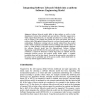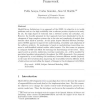156 search results - page 19 / 32 » Requirements Traceability |
ER
2004
Springer
14 years 3 months ago
2004
Springer
Social and intentional behaviours appear as two main components of the agent paradigm. Methods of conventional software engineering do not seem to be appropriate to gain a full kno...
RE
1999
Springer
14 years 2 months ago
1999
Springer
Requirements Engineering (RE) investigates the impact of a future-oriented change vision, but the move towards this vision must consider a context heavily shaped by the past. As R...
SE
2008
13 years 11 months ago
2008
: Software lifecycle models differ in their artifacts as well as in the dependencies between the included tasks and activities. Therefore support-tools, which support these lifecyc...
ENTCS
2006
13 years 9 months ago
2006
Model-Driven Architecture is an approach of the OMG, its objective is to tackle problems such as: the high availability that a software product requires to be ready for use, the h...
IFM
2007
Springer
14 years 3 months ago
2007
Springer
The Behavior Tree notation has been developed as a method for systematically and traceably capturing user requirements. In this paper we extend the notation with probabilistic beha...


